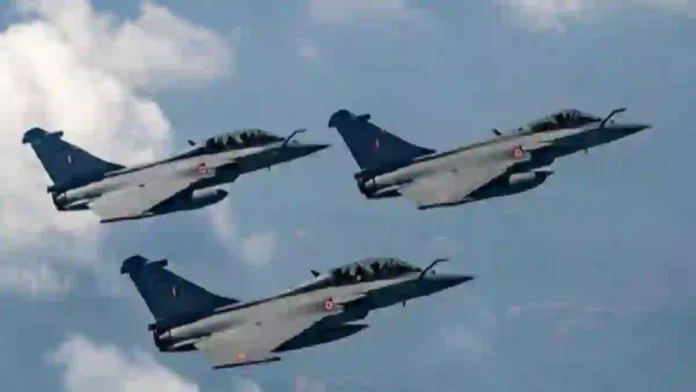A coordinated disinformation campaign has been launched by China and Pakistan targeting the reputation of the French-made Rafale fighter jets following India’s recent precision strikes on terrorist camps in Pakistan, reported Manu Pubby of Economic Times.
French and Indian government sources have confirmed that this operation, involving fake news, doctored videos, and misleading social media content, aims to undermine the credibility of the Rafale, promote rival platforms like the Chinese J-10, and cast doubts on the India-France defence partnership.
The campaign intensified after Indian Air Force Rafales, armed with SCALP missiles, played a central role in the strikes on May 7 and subsequent operations, which successfully targeted high-value terror infrastructure in Pakistan.
In the wake of these strikes, a wave of misinformation emerged, including fabricated claims that Rafale jets underperformed, were shot down, or that France had asked India to halt their operational use. Notably, one false narrative suggested Indonesia was reconsidering its Rafale purchase, which was debunked when France and Indonesia signed a new agreement to expand their Rafale order.
Read- Work Underway On Layered Defence Systems Like Iron Dome, Says DRDO Chief
Indian government sources and independent fact-checkers have systematically refuted these claims. The Press Information Bureau (PIB) and Indian Embassy in China have exposed several viral images and videos as recycled from unrelated incidents, such as a 2021 MiG-21 crash in Punjab, falsely presented as evidence of Rafale losses during Operation Sindoor.
PIB has cautioned the public to remain vigilant against “Pakistan-sponsored propaganda” and to report dubious content for verification.
Pakistan’s Defence Minister, Khawaja Asif, further fuelled the narrative by publicly claiming, without evidence, that five Indian jets were shot down—statements he was unable to substantiate when pressed by international media. This reliance on social media rumours and doctored evidence has drawn criticism and embarrassment for the Pakistani leadership.
Chinese involvement in the campaign is evident through the amplification of these narratives on Chinese social media platforms, including TikTok, and through flawed technical analyses that seek to elevate Chinese military technology over Western counterparts. Some Chinese-origin misinformation has also migrated to Western platforms, gaining traction beyond the region.
Read- India France: 60 Per Cent of Rafale Manufacturing May Shift To India
Despite these efforts, Indian officials, including Chief of Defence Staff Gen Anil Chauhan, have emphasised that all selected targets were successfully engaged during the operations and that no Rafale jets were lost as claimed.
Gen Chauhan also noted that nearly 15% of operational time during Operation Sindoor was spent countering fake news and disinformation, highlighting the evolving nature of modern conflict where information warfare is as critical as kinetic operations.
Independent defence analysts caution that, while both sides have suffered losses and the full operational picture remains unclear, the current flood of disinformation makes it difficult to draw definitive conclusions about the technical performance of any particular platform.
However, the immediate impact of this campaign is clear: it seeks to erode confidence in the Rafale and the India-France defence relationship while bolstering the image of Chinese and Pakistani military capabilities.
The disinformation operation orchestrated by China and Pakistan in the aftermath of India’s successful airstrikes has been met with robust fact-checking and official denials from Indian and French sources. The episode underscores the growing importance of information warfare in shaping public perception and strategic narratives in contemporary conflicts.
Based On Economic Times News
Agencies




